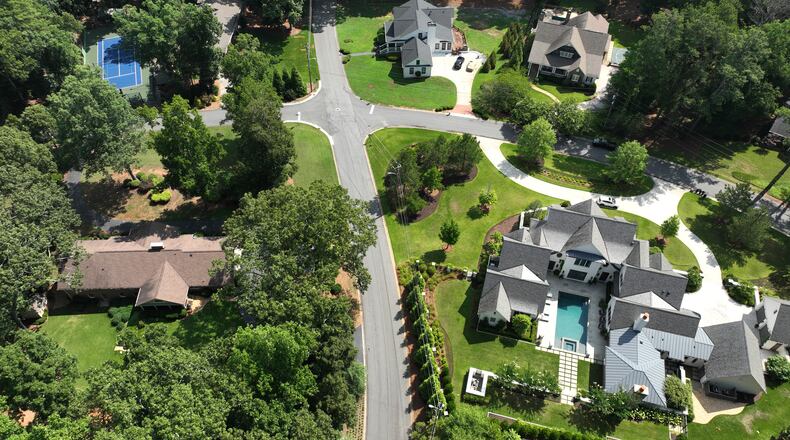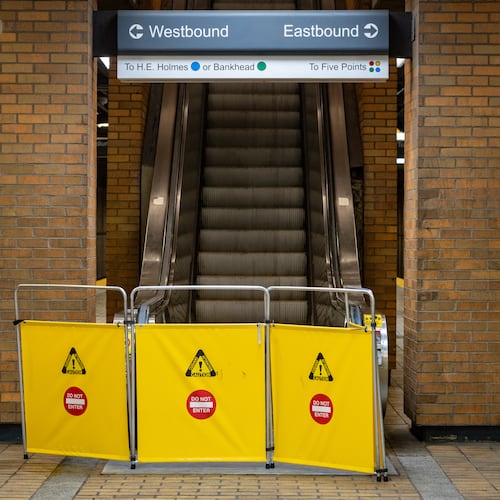More money will flow into local governments coffers soon, thanks to the skyrocketing housing market in metro Atlanta. And homeowners, already feeling the squeeze of inflation, will see their tax bills increase even if the tax rates remain the same.
Property taxes — the biggest source of revenue for counties, cities and school systems — are determined by the assessed value of property and a tax rate typically set each summer by elected officials.
An analysis of taxable properties in metro Atlanta by The Atlanta Journal-Constitution shows residential values outpaced those of commercial and industrial parcels, meaning homeowners and renters will fund a larger percentage of local government. Residential properties make up about 65% of tax digest values.
The value of taxable property in metro Atlanta’s four core counties — Cobb, DeKalb, Fulton and Gwinnett — has increased by 17% over the past year, surpassing half a trillion dollars for at least a second year.
Gwinnett saw a 31% increase in taxable property values in one year, 70% over five years. In Cobb, homeowners in an affluent neighborhood along St. Mary’s Lane in northern Marietta saw their appraisals increase by about 50%.
While the increased amount each homeowner must pay is not dramatic ― the proposed tax increase for a Cobb home valued at $500,000 is $189.80 without a homestead exemption — added together they generate millions more in revenue for local governments.
Through public records requests, the AJC obtained each metro county’s list of assessment changes for the upcoming tax year. This data reflects the same information property owners see on their notice of assessment, primarily the assessed value of the property and an estimate of how much taxes might be owed.
In the provided data, only Cobb and Gwinnett listed reasons for the changes in assessment. At least 70% of properties there had increased values attributed solely to changes in market conditions.
Throughout the four counties in the metro area, the median value of residential property increased from $245,900 to $304,000, or about 24%, in the past year. Fulton County residential property owners saw the smallest increase of 15%, while those owners in Gwinnett County saw a 31% increase.
Commercial property owners in the area saw their values rise from a median of $432,800 to $472,000, or about 9%. Once again, Fulton County commercial property owners saw the smallest increase of 2.7% while those owners in Gwinnett County saw a 19%increase.
Because homes are worth so much more, local governments can collect more property tax revenue and elected leaders can claim they didn’t raise tax rates. Each core metro county plans to do exactly that to fund bigger budgets, but state law considers the maneuver a tax increase. Cities and school systems are adopting the same strategy.
Cobb’s government is expected to get the largest influx of cash in metro Atlanta, an additional $51 million. But it isn’t an outlier. DeKalb, Fulton and Gwinnett counties are expected to collect more than $30 million in additional revenue each. State law considers that a tax increase of 5.9% in Fulton, 7% in DeKalb, 12.6% in Cobb, 14% in Gwinnett. DeKalb is the only one of those counties that has set its tax rate, and the rest are scheduled to finalize their rates by the end of August.
Higher home prices boost budgets
Property taxes on homes and businesses are the primary funding source for schools, police departments and other essential services. Businesses can pass their additional tax burden on to customers, unlike homeowners.
The median list price of a metro Atlanta home has climbed 28% in the past two years, surging to an all-time high of more than $400,000. It’s not just homeowners filling the gap; landlords pass their costs down to renters.
“The folks that get caught in the middle are the tenants,” Fulton County Commissioner Lee Morris, whose district includes Buckhead, told the AJC.
Morris, a Republican, said he doesn’t know what the solution could be but he’s glad the county has awarded low-wage renters millions in federal pandemic relief dollars. “But that’s not necessarily fair to the young professional paying $2,225 in rent,” he said.
Across metro Atlanta, the millions in extra revenue will be used to woo police officers and other city workers who have been leaving in droves since the onset of the COVID-19 pandemic.
Because homes are worth so much more, budget hawks say local governments should cut the tax rates and give property owners a break.
“There is no focus on fiscal responsibility in this budget,” Lance Lamberton, chairman of the Cobb County Taxpayers Association. “Given the amount of money they’re getting from the federal government (in pandemic relief funds), putting an additional tax burden on taxpayers under the current circumstances, this is the wrong thing to do at the wrong time.”
Government officials argue the additional revenue may look huge, but funds dissipate quickly when inflation, competitive salaries and additional services are taken into account. In Dunwoody, the city is grappling with its first property tax increase since it was founded, and that’s primarily due to the massive underestimate of how much parks would cost. The initial estimate was $300,000, but the cost is currently 10 times higher at about $3 million, and it’ll only increase with new parks set to open.
“With new parks on the horizon and inflation the way it is, we want to be prepared for the future,” Assistant City Manager Jay Vinicki said of the city’s plan to raise taxes to the tune of $1.6 million.
Other officials, such as Cobb County Manager Jackie McMorris, said budget increases are the only option. “There is no additional scrubbing” they can do to get rid of costs, McMorris said.
Payrolls rise amid record inflation
Inflation hit a 40-year high in the United States, and in May the Bureau of Labor statistics found metro Atlanta’s inflation rate was the second highest in the country.
Georgians see the financial effect every time they visit the gas pump or restock the fridge. But the loss of purchasing power also affects government budgets.
Patrick Bryant, the city manager for Avondale Estates, said the city’s buying power will decrease due to inflation even with the additional $223,000 in revenue generated from the same tax rate.
The cost of hiring and maintaining employees is also increasing, putting pressure on short-staffed cities and counties. According to the latest report from the U.S. Department of Labor, the private sector has fully recovered all jobs lost amid the pandemic, but the government sector is still down more than 660,000 jobs.
Cobb County has shed workers at a rapid rate, leaving nearly 700 positions vacant since the onset of COVID-19. The county’s proposed $1.2 billion budget seeks to replenish the depleted staff by funding 148 full- and part-time positions, while also raising the lowest-paid worker’s wage to $17 an hour, up from as low at $11.50 currently.
While some have described the depleted staff as a crisis for Cobb, Lamberton said it’s an opportunity for county leadership to optimize their government and make certain departments more efficient.
The tax hawks’ complaints mirror that of the county’s two Republicans on the Democrat-led commission, who said the salary raises go beyond the city’s current means. Commissioner Keli Gambrill, a West Cobb Republican, raised concerns that a $17-an-hour minimum pay might not be sustainable without future tax increases.
Similar discussions are also taking place in Gwinnett, another metro Atlanta county that recently saw its political leadership shift from Republican to Democrat. Financial Services Director Buffy Alexzulian told county commissioners that the extra property tax revenue is needed for government employee raises to stay competitive and maintain its workforce.
Dunwoody, which has shed police officers over the past few years, has offered multiple rounds of raises and extra benefits to attract new cops and keep its department functioning. The city adopted a 6% pay raise this year, which followed multiple rounds of increases that has brought the average cop’s pay by nearly 21% since 2020.
The pay hike and the high cost of parks has some Dunwoody residents questioning whether city leadership has its priorities in order.
“I hear why you want it, but I don’t hear why you need it at this point in time,” Dunwoody resident Rob Weir said during a recent public meeting.
That exact tension animated Fulton County commissioners at their last regular meeting. County staff recommended keeping the millage rate flat, explaining it would be considered a tax increase.
Fulton County Commission Chairman Robb Pitts and Commissioner Bob Ellis, a Republican who represents part of North Fulton, argued for keeping the tax rate the same when it comes to a vote in August.
But a rare bi-partisan coalition tried to approve the rollback rate.
“People are hurting out there, and the thought of having to pay more in taxes is nothing I could support or explain to anyone in my community,” said Commissioner Liz Hausmann, the Republican who also represents north Fulton.
Commissioner Natalie Hall, a Democrat who represents much of Atlanta, seconded her effort.
“There are some people who don’t even have a dollar to spare,” Hall said.
Recent coverage of property tax issues in the AJC
Cobb
— Cobb’s proposed $1.15 billion budget for 2022 is 11% higher than last year.
— The county expects an additional $51 million in revenue due to rising property values. State law considers this a 12.6% tax increase.
— The county digest of taxable property increased 12.6% in one year, 49% in five years.
DeKalb
— DeKalb leaders approved a $1.5 billion county budget in February, up 8.7% from 2021.
— DeKalb projects taking in an additional $32 million in property taxes. State law considers this a 7% tax increase.
— The county digest of taxable property increased about 15% in one year, 63% in five years.
Gwinnett
— The county approved a $2.07 billion budget for 2022 in January, up 8.1% from last year.
— Gwinnett plans to take in an additional $34 million in property taxes. State law considers this a 14% tax increase.
— The county digest of taxable property increased 27% in one year, 70% in five years.
-- Alia Malik, Brian Eason, George Mathis and data intern Hannah Ziegler contributed to this article.
How property taxes work
>Georgia counties, cities and school systems are funded primarily by property taxes. State and federal government is funded mostly by income taxes.
>Property taxes are determined by the assessed value of the property, which is 40% of fair market value, and local tax rates set annually by county, city and school leaders. Homestead exemptions lower tax bills but vary by jurisdiction.
>The property tax rate, or “millage,” equals $1 of tax for each $1,000 of assessed property value.
>Example using 2021 rates in Atlanta without a homestead exemption: A $400,000 home would have an assessed value of $160,000. Fulton County’s millage was 9.33, the city of Atlanta’s 7.85, Atlanta schools 20.74 for a combined 37.92 mills. Divide the total millage by 1,000 and multiply by $160,000 to get a total tax bill of $6,067.20.
>Property taxes can usually be contested within 45 days of receiving a new assessment. Forms to start the appeal process can be found on county tax assessor websites. (Fulton | DeKalb | Cobb | Gwinnett)
>If property taxes are not paid, the county can sell the property without the owner’s consent.
Keep Reading
The Latest
Featured





